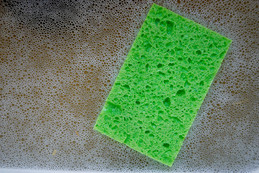
Have you noticed lately that your kitchen sponge needs some cleaning? Or maybe you’ve just cleaned a large mess in your kitchen and are pondering if you should simply toss it for a new one. Or should you try to clean it instead? The truth is that you don’t need to throw it away. You can get lots of great use out of your sponges and still have the peace of mind that it’s clean. Let’s take a look at a few simple methods for cleaning the kitchen sponge. You’ll want to perform one of the following at least once every 3 or 4 days.
While these are effective solutions for keeping your sponges clean, you should still replace your sponges every now and then - no matter what you use them for or how often you clean them. Still, by cleaning your sponges on a regular basis (every 3 to 4 days), you can help prevent the spread of mold, yeast, bacteria, and germs and maintain a clean kitchen and home for you and your family.
~ Jenny
- If you have a metal-free sponge, you can use the microwave to banish germs. Saturate your sponge completely. Place it on a paper towel in the microwave alongside a glass of water (this protects the microwave emitter). By setting the microwave for two minutes, you can kill up to 99% of germs present on your sponge, along with bacteria, mold, and yeast. Remove the sponge and let it cool completely before attempting to use it again.
- Another simple way to clean your sponge is by soaking it in a mixture of ½ cup vinegar, 3 tablespoons salt, and 1 cup of hot water overnight. The next day, squeeze it, and then allow it to dry. Viola! Your sponge is clean and ready to be used again.
- You can also just throw your sponge into the dishwasher and allow it to remain through the entire wash and dry cycle. How simple is that?
- You might also use a solution of 10% bleach on your sponge after cleaning it with regular dish detergent and hot water. Soak the sponge for 5-10 minutes. Squeeze it a few times during the process to really let the cleaning solution soak in (you may want to be wearing gloves to protect your skin). Then rinse the sponge thoroughly in hot water after removing it from the bleach solution.
While these are effective solutions for keeping your sponges clean, you should still replace your sponges every now and then - no matter what you use them for or how often you clean them. Still, by cleaning your sponges on a regular basis (every 3 to 4 days), you can help prevent the spread of mold, yeast, bacteria, and germs and maintain a clean kitchen and home for you and your family.
~ Jenny
 RSS Feed
RSS Feed